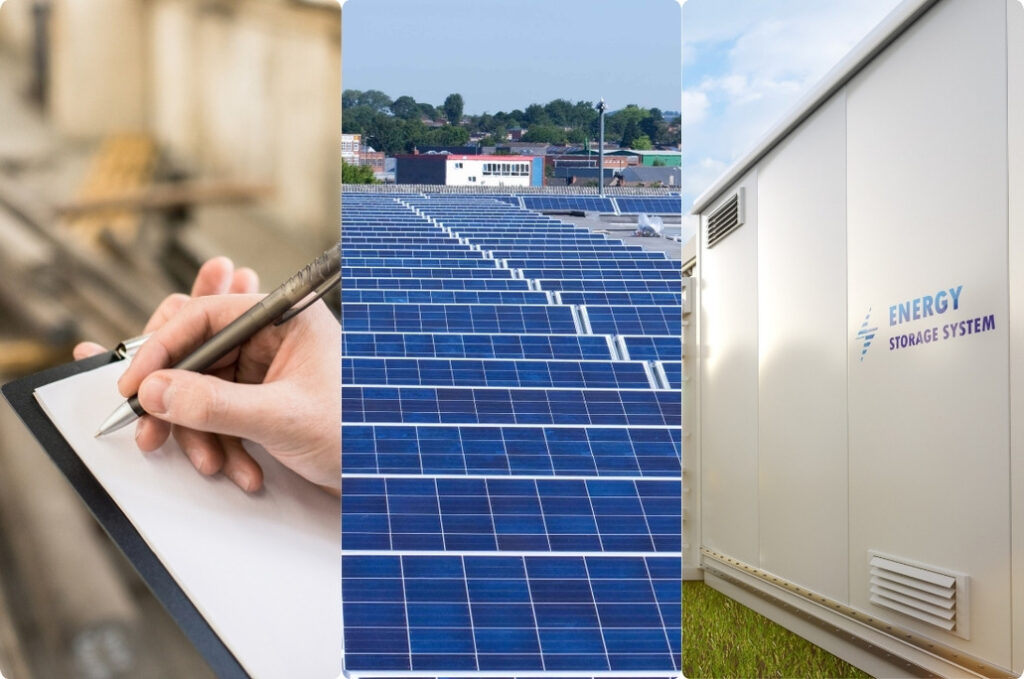Solar and Battery Energy Storage Systems: Unlocking Energy Independence for MSMEs
- By user

A business can reduce its electricity costs by over 40% within ten years by opting for rooftop solar PV in combination with batteries, as highlighted in the Solar Plus Energy Storage 2024 report published by Auroville Consulting, a power sector research organization. This blog explores the numerous advantages of rooftop solar energy paired with Battery Energy Storage Systems (BESS) for MSMEs in India, examining trends, technological advancements, and economic and energy security considerations. Integrating solar with BESS is a strategic move towards a sustainable energy future as it significantly reduces greenhouse gas emissions (GHG) compared to electricity sourced from the public grid with its heavy reliance on coal power plants. Operation is simple: solar panels generate electricity during the day, and excess energy is stored in batteries for later use, thus reducing the use of grid electricity. This system offers several advantages: energy supply reliability, reducing fossil fuel reliance and lowering GHG emissions.
Great technological advances
Technological advancements have significantly improved the efficiency, reliability, and affordability of solar and BESS. Innovations in solar PV technology, such as bifacial panels and high-efficiency modules, have increased energy output and reduced costs. Similarly, advancements in battery technology, including lithium-ion and emerging solid-state batteries, have enhanced energy storage capacity and lifespan.
According to the International Renewable Energy Agency (IRENA), the cost of solar photovoltaic (PV) modules has dropped by about 90% over the past decade. Similarly, the cost of lithium-ion batteries has fallen by nearly 85% during the same period. In addition, smart grid technology and energy management systems optimize the use of solar and BESS, enabling real-time monitoring and control of energy generation, storage, and consumption. This ensures maximum efficiency and cost savings.
Subsidies for Investment
In India, government initiatives such as the Solar Rooftop Program – PM Surya Ghar: Mufti Bijli Yojana offer subsidies that help reduce investment costs. However, these initiatives primarily target residential consumers. For MSMEs adopting rooftop solar, the government provides tax benefits like accelerated depreciation, along with support from financial institutions offering easy financing options. MSMEs can also explore state-specific programs or partner with DISCOMs to fully capitalize on the available benefits.
A financially winning choice
For MSMEs, the economic viability of rooftop solar and BESS can be assessed using Return on Investment (ROI) and payback periods. Initial investment costs are offset by long-term savings on energy bills, reduced diesel generator usage and reduced operational disruptions. The Solar Plus Energy Storage 2024 report by Auroville Consulting estimates that an industrial consumer could achieve significant savings by designing a system facilitating solar energy penetration of approximately 60%.
In another example, an MSME investing in a 50 kW solar plus BESS system can see a financially attractive payback period of below 5 years. The savings on electricity bills, combined with increased productivity due to reliable power supply, contribute to a favourable ROI.
Statcon Energeiaa’s modern office in Noida sets a notable example of innovation. The office has installed a hybrid grid-tied solar system featuring 30 kWp PV panels, a 100 kWp hybrid inverter, and 240V/300Ah batteries. Financial analysis indicates a payback period of approximately 4.43 years, along with significant hidden savings. This case is explored in detail in the Solar Plus Energy Storage 2024 publication by Auroville Consulting.
Improve energy reliability
Energy security is crucial for MSMEs, which often face challenges related to unreliable grid power and frequent outages. Solar plus BESS systems provide a consistent and reliable energy source, mitigating these issues. During grid outages, stored solar energy can power essential operations, reducing downtime and associated losses.
For instance, an MSME needing continuous operation can significantly benefit from solar and BESS by ensuring backup power, avoiding production delays, and maintaining product quality. Solar plus BESS can effectively replace diesel generators.
Future Outlook
The future of solar and BESS in India looks promising, driven by declining costs, technological advancements, and supportive government policies. As India progresses towards its renewable energy targets, the adoption of solar plus BESS systems is expected to rise among MSMEs.
Increasing awareness of environmental sustainability and energy independence will further fuel this growth. Innovations in energy storage and management will continue to enhance system performance, making solar and BESS an even more attractive option. According to a National Renewable Energy Laboratory (NREL) , by 2030, the per unit cost of battery energy storage system would reduce by 32% and further reduce by 51% in 2050.

eSunScope
September 3, 2024 at 12:05 pmThank you for sharing this insightful article with us. It provides valuable information and perspective on the topic, making it easier to understand and appreciate the subject. Much appreciated!